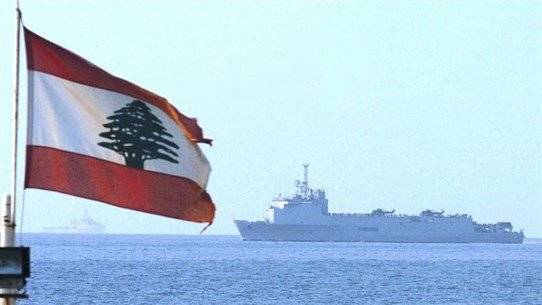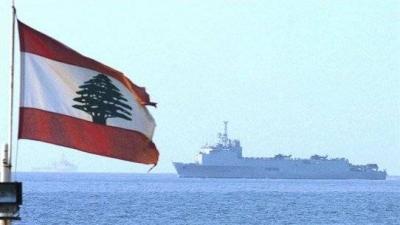Is the maritime border demarcation file returning to the forefront of interests once again? Is there a possible upcoming visit by U.S. mediator Amos Hochstein to Lebanon? What did General Abbas Ibrahim convey to U.S. officials regarding this matter? These questions arise from recent rumors suggesting that the file is being seriously discussed following Hezbollah's latest warning that Lebanon will not remain a mere observer while Israel explores wealth in the Karish field. Following the announcement by Greek company Energean that it had obtained the rights from Israel to explore gas in the Karish field, which overlaps with the territorial waters on the northern border with Lebanon, no developments had occurred in the maritime border demarcation file with Israel, except for the recent position of Hezbollah's Secretary-General, Sayyed Hassan Nasrallah, who called for a "national consensus on how to protect this wealth and how to extract it." He emphasized that "what we need is the courage to lease to avoid further debt... If the enemy wants to prevent us from exploring, we are capable of stopping them." This statement acted as a warning to Israel, not excluding the companies that have started exploring.
Hezbollah's warning revived stagnation in the file after Lebanon had, following the last meeting of the three presidents, invited mediator Hochstein to resume his mediation before Lebanon enters its electoral race. This is the second time Hezbollah has intervened in the demarcation process after assigning the task to the state, promising to intervene when necessary. It is no longer possible to remain neutral while Israel is exploiting time for exploration and leasing companies to take advantage of the wealth, while Lebanon remains stagnant, burdened by its financial crisis.
The new development outside the official context was the visit by General Abbas Ibrahim, which sources say included discussions on the maritime border demarcation file. A security source confirmed that, although the primary purpose of the visit was to address the file of American detainees in Syria, including U.S. journalist Austin Tice, who was detained in 2012 while covering the Syrian war, the borders were also discussed. Cross-sources indicate that General Ibrahim raised the issue in Washington without dismissing the possibility of meeting with mediator Hochstein. The sources stated that General Ibrahim did not convey an official message but presented Lebanon's perspective regarding Hochstein's latest offer, reaffirming that Lebanon will not accept Israeli encroachment on its borders and that it should not exploit oil and gas while preventing Lebanon from benefiting from its resources.
Israel starting exploration in a disputed field cannot be overlooked by Hezbollah, while it has begun extracting and selling oil before reaching an agreement with Lebanon on border demarcation. Sources following the file indicate that "Hezbollah" sensed that the U.S. is in a hurry and seeks to secure two foundational guarantees related to the demarcation of its borders with Lebanon. The first pertains to the speed of demarcation and extraction of oil and gas in the region, and controlling it in light of the Ukrainian-Russian crisis, with the upcoming battle concerning who will control the oil wealth. The second relates to Israel's security and its guarantees on the border.
The U.S. is rushing the nuclear agreement with Iran while the Iranian side insists on obtaining assurances that any agreement will not be subject to cancellation, attempting to avoid the experience of former U.S. President Donald Trump, who annulled the agreement upon winning the presidency. This attempt could be repeated amid expectations of Republican victories this time. If the Iranian-U.S. nuclear deal does not materialize as quickly as expected due to differing calculations, Lebanon, like Israel, should hasten to benefit from its wealth to address its financial crisis. Under this premise, it sent an initial response to Hochstein's proposal affirming two basic principles:
- Resuming negotiations between Lebanon and Israel from where they left off.
- Rejecting Israel's commencement of exploration while preventing Lebanon from benefitting from its wealth.
Beyond Hezbollah's warning message to Israel, the official Lebanese side, particularly the President of the Republic, is attempting to expedite this file. However, will the circumstances be suitable for meaningful progress? Given the facts, with a caretaker government and the proximity of electing a new president, it may be appropriate to postpone discussing this file until a new president is elected, returning the file to the jurisdiction of Speaker Nabih Berri. As for the time between now and then, hopes remain weak due to the imposed economic sanctions on Lebanon.
Former head of the military technical negotiating delegation regarding the southern maritime borders, Brigadier General Bassam Yasin, wrote on his page, "No one thinks we can extract oil and gas from the sea in the near future without amending Decree 6433 and adopting line 29 as a starting point for negotiations, or at the very least adopting what Lebanon stated in its letter to the United Nations on January 28, 2022, regarding viewing the Karish field as disputed and warning companies against working for Israel in disputed areas." He announced that Lebanon is "prohibited from exploring oil and gas in our sea due to pressures on these companies, and the only solution to lift this prohibition is to pressure the enemy and prevent Energean from extracting oil and gas from the Karish field before reaching a fair solution, through amending Decree 6433 and considering this field disputed, as stated in Lebanon's letter to the United Nations on January 28, 2022." However, there is no agreement on such an amendment, raising the question of whether the fate of the file will be postponed to the next government or to after the new presidency.




